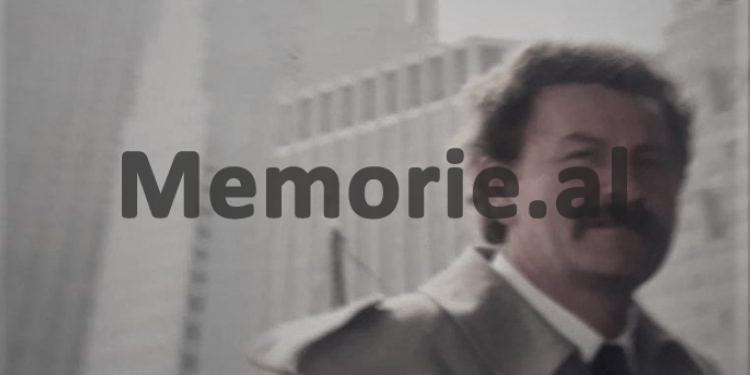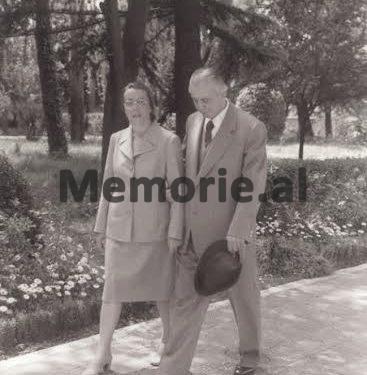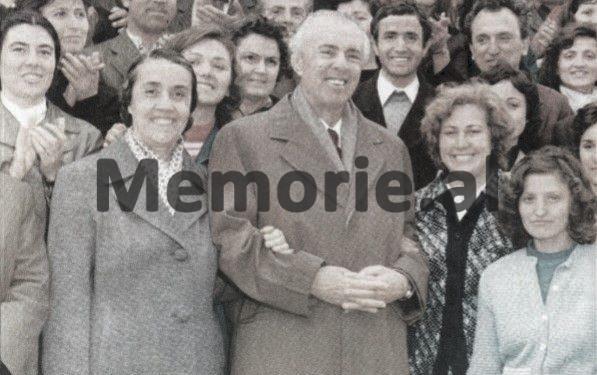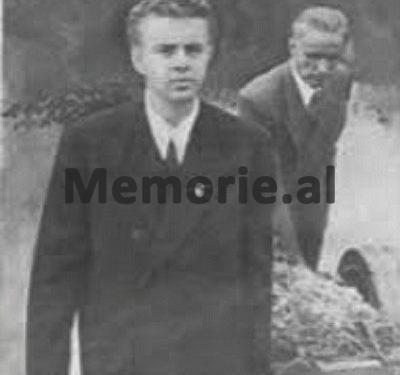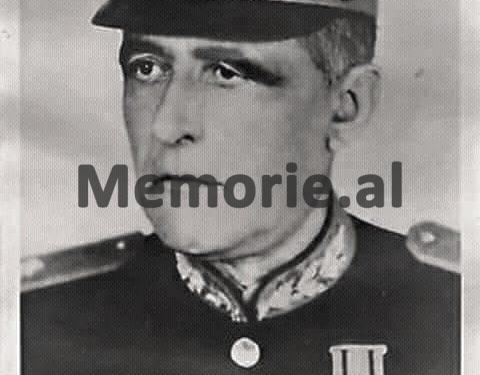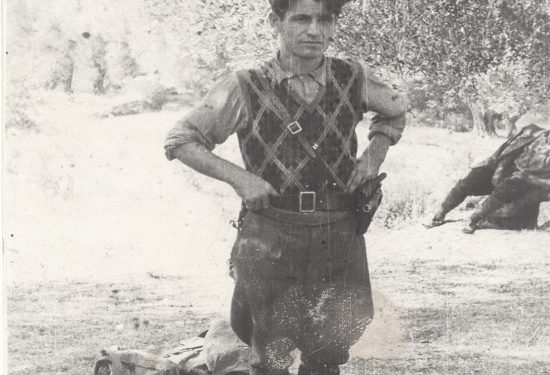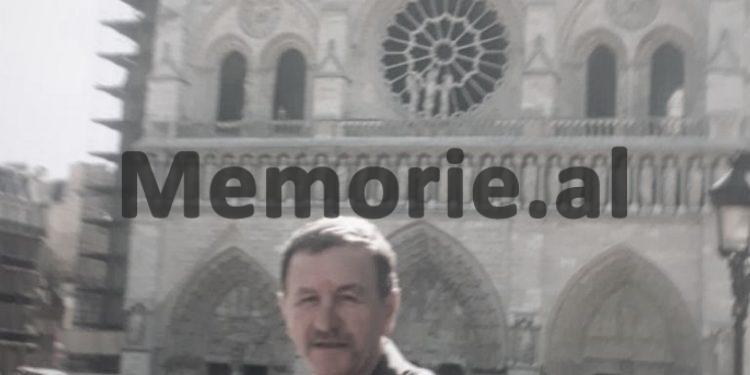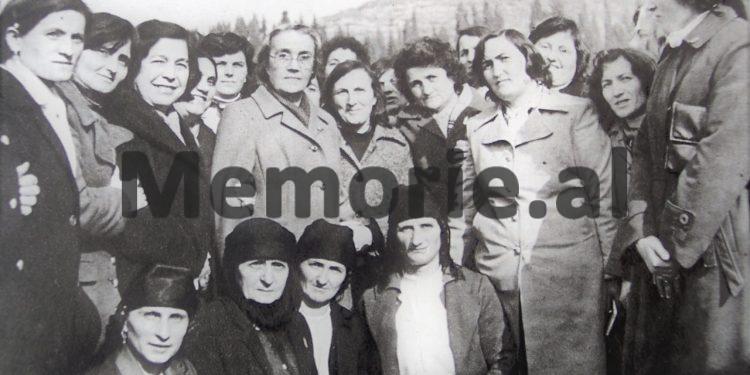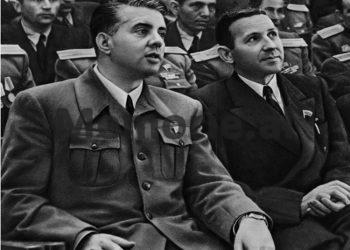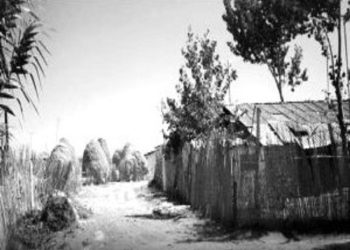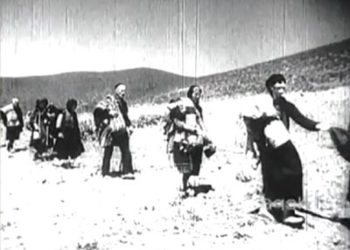By Bashkim Trenova
Part thirty-eight
Memorie.al publishes the memoirs of the well-known journalist, publicist, translator, researcher, writer, playwright and diplomat, Bashkim Trenova, who after graduating from the Faculty of History and Philology of the State University of Tirana, in 1966 was appointed a journalist at Radio- Tirana in its Foreign Directorate, where he worked until 1975, when he was appointed journalist and head of the foreign editorial office of the newspaper ‘Zeri i Popullit’, a body of the Central Committee of the ALP. In the years 1984-1990, he served as chairman of the Publishing Branch in the General Directorate of State Archives and after the first free elections in Albania, in March 1991, he was appointed to the newspaper ‘Rilindja Demokratike’, initially as deputy / editor-in-chief and then its editor-in-chief, until 1994, when he was appointed to the Ministry of Foreign Affairs with the position of Press Director and spokesperson of that ministry. In 1997, Trenova was appointed Ambassador of Albania to the Kingdom of Belgium and to the Grand Duchy of Luxembourg. Unknown memories of Mr. Trenova, starting from the war period, his childhood, college years, professional career as a journalist and researcher at Radio Tirana, the newspaper ‘People’s Voice’ and the Central State Archive, where he served until the fall of the communist regime of Enver Hoxha, a period of time when he in different circumstances met many of his colleagues, suckers of some of the ‘reactionary families’, etc., whom he described with a rare skill in a book of memoirs published in 2012, entitled ‘Enemies of the people’ and now brings them to the readers of Memorie.al
Continued from the previous issue
WITH “HEROES OF THE PEOPLE”
POLITICAL BUREAU AND THE PRESIDENCY
Enver proposed to Myslym Peza, to intern the children he had with his first wife!
While staying at Myslym Peza’s house, Enver Hoxha noticed for a moment that Dija, Myslym’s daughter, was not there with other family members. He addressed Skënder, Myslym’s eldest son, with the question: “Did I know where he is, Skënder?” Dija had not come to say goodbye to her father. She had not met him for years. Skënderi, surprised, perhaps even scared by Enver’s question, answers in a soft voice: “It’s a little unhappy, Comrade Enver”.
This care of Enver Hoxha for the parent-child relations in the family of Myslym Peza, after his death, was both hypocritical and cynical. I remember a story by Myslym Peza about Enver Hoxha, after he broke up with his first wife Zenepen and married Milen. Myslym’s children with Zenepen left the house, condemning Myslym’s second marriage. Skënderi writes a letter to Enver Hoxha in this spirit. In these circumstances, Enver Hoxha proposes to Myslym to deport his bakery children. “I,” he says to Muslim, “have a friend for you.” “I have nothing for Skënder.” Myslym responded to this proposal with the words: “If my son has made a mistake against the Party, okay, let him be interned. “If he proposes to deport me for the problems we have between us in the family, no, there is no need for him to be deported.” I heard these words from Myslym Peza himself.
Enver Hoxha’s perverted mind probably worked badly even when he asked Skënder about Knowledge. The fact is that Skënder immediately talked to Dija and the next day, after more than 25 years, Dija goes to say goodbye to her father, after he was buried. Enver was never remembered for the mutual love of parents – children in the Peza family, while Myslymi was alive. He never asked what Dija and Skënderi, or Partizani, do, what does Zenepja, this very noble woman, seriously ill, do? His brain was ready to act immediately just to injure, to ruin, and to destroy. As this case shows, but also many others during the years he was in power, family was of no value to him, he saw friendship only as an opportunity offered to him to strike, on her behalf, to be satisfied by the pains, the tragedies, the endless macabre of his infinite power.
Enver got angry with Myslym Peza, for the memories he was writing!
Enver Hoxha more than once in his speeches or in his memoirs, has raised the figure of the ‘People’s Hero’ Myslym Peza. He, as he himself said, wept over the pain caused to him by the death of Muslim. On June 4, 2011, “Gazeta 55”, right-wing and close to Sali Berisha, published several pages from Enver Hoxha’s secret diary written two years before Myslym’s death. Reading Enver Hoxha, he realizes that he is dissatisfied, even angry with Myslym Peza, or more precisely with the memories of Myslym Peza, which he describes as “perverted, individual, subjectivist”. Below Enver Hoxha seeks to cast doubt and present Myslym as an old agent of the Yugoslavs, to link his memories with “Mehmet Shehu’s very hostile work as an agent of the Yugoslavs”, or with the “plot of Mehmet Shehu”, the former Albanian Prime Minister , killed or committed suicide in December 1981. In his diary, Enver Hoxha makes the same accusations and suspicions about Haxhi Lleshi and concludes: “Is the finger of the Yugoslavs behind them?”
I cannot undertake to prove the originality of Enver Hoxha’s diary. If it is original, this diary testifies to me once again of its hypocritical and paranoid character. It is a known fact that out of the 13 members of the General Staff of the National Liberation Army, only Myslym Peza and Haxhi Lleshi had escaped from Hoxha’s iron hand. Mustafa Gjinishi, Koci Xoxe, Dali Ndreu, Liri Gega, Nako Spiro and Baba Faja were executed, Abaz Kupi escaped, while Bedri Spahiu, Spiro Moisiu and Ramadan Çitaku were imprisoned and persecuted. Maybe Enver Hoxha thought that through the memories of Myslym Peza and Haxhi Lleshi, to discover a new enemy conspiracy and to annihilate them as well?! Everything is possible. Thus, it would turn out that the Anti-Fascist War in Albania was led by traitorous agents, but this was of little or no importance to Enver Hoxha. He thus remained the only glorious and legendary leader of the National Liberation Army, the savior of an entire nation and homeland!
I expressed above the doubt about the authenticity of Enver Hoxha’s secret diary. In fact, I had heard “stories” like Enver Hoxha about Myslim Peza several years ago. When I was working as the press director and spokesman of the Ministry of Foreign Affairs, in 1994-1995, one day, a young man from Shkodra, called Bardhi, came to my office. He was one of the employees of the National Intelligence Service (SHIK). There were some of them in the Ministry at that time, who was preparing to be sent to the Albanian embassies. Knowing that I had previously been the editor-in-chief of “Democratic Renaissance”, but not knowing that Myslym Peza had been my mother’s uncle, he asked me to help him publish an article about Myslym Peza. Bardhi told me openly that SHIK had assigned this task to him. The content of the SHIK article was similar to Enver Hoxha’s secret diary. Of course I refused to cooperate with the viewer.
It is interesting that “Gazeta 55”, publishing parts of Enver Hoxha’s secret diary about Myslym Peza, does not keep any distance, but fully agrees with the dictator’s opinion, presents it as irrefutable evidence that proves who was in it true Myslym Peza! As a rightist, as it appears, she has always sought to be sold as a champion of the Albanian press in extremely critical assessments of Enver Hoxha and his deeds. For Myslym Peza she finds no other reliable reference than the dictator! Normally, Enver Hoxha’s denigrating assessments of Myslym Peza should be done in his honor. They prove that he remains a pure figure until the end of his life.
How did the memories of Myslym Peza transform into the book “When I gave my promise”?!
Regarding the memoirs of Myslym Peza, I know that he refused to be written by anyone else. He himself, being blind, could not write them, so, as he told me, he had asked him to record these memories in his own voice. He wanted to tell the truth, without embellishments, without distortions as he had lived it, let others then do as they please. In fact, they did. The publication “When I made the promise”, with memories of Myslym Peza, is a serious elaboration and “stylization” of the original of Myslym Peza’s memories. I am not familiar with the recorded memories of Myslym Peza. Despite this fact, I know very well his language, vocabulary, thought, expressions he used as well as the way he evaluated an event, a person or personality. I was present on one occasion and I saw him, at least to be surprised, when he read how his first meeting with Enver Hoxha was presented, how he supposedly thought about Enver Hoxha, as soon as he saw him, that in the steps the first when he was running near him!
If Enver Hoxha has remained dissatisfied with the memories of Myslym Peza, and is even angry with them and threatens with “measures” to save the Party and the people, this has only one explanation. Myslymi, as it seems, in his memoirs, left to Enver Hoxha the place he had in those years and not what the communist historiography of the years of dictatorship assigns to him. Myslymi, with his truths, talking about ordinary peasants, nationalists, not talking about the role of the Communist Party in the Peza Conference, etc., divorced him, and lowered him from Olympus. The dictator could never forgive Myslym Peza for this.
Myslymi and Haxhi Lleshi were happy for the death of Mehmet Shehu!
If dictator Hoxha connects the memories of Myslym Peza and Haxhi Lleshi with the name of Mehmet Shehu, the truth is that both have had no consideration for Mehmet Shehu. During the years of the War, in the meetings they had with Mehmet Shehu in Debar and Peza, they quarreled with him and opposed the orders he had given for the killing of innocent people. I have never seen Mehmet Shehu visit Myslym Peza’s house. He and Haxhiu not only fought but also hated Mehmet Shehu. I learned this after the murder or suicide of Mehmet Shehu. I went to one of those days at Myslym’s house. There I also found Haxhi Lleshi. The two had been waiting for the news of Mehmet Shehu’s murder or suicide. Laughing, they told me that they, in their conversations, when they talked about Mehmet Shehu, always mentioned him not by his name, but “he idiot”! This delayed sincerity may have shocked the dictator as well.
Mehmeti has been his right-hand man, prime minister and number two in the party and state hierarchy for several decades. They have embraced, kissed and conspired for decades, thus demonstrating their great friendship and loyalty to the death to each other, or as it was said, to the Party. Now he “discovered” that Myslymi and Haxhiu during this whole period have called him in their conversations – “he idiot”! So he had the “shit” as the closest man and did not smell it! Being paranoid, he could not help but suspect that Myslymi and Haxhiu, while secretly speaking to others in this language about his friend for the head, also spoke about him! Nor could he forgive Myslym or Hajj.
Enver’s suspicions and dissatisfactions towards Myslym Peza, since the War period!
It seems to me that Enver Hoxha’s suspicions and dissatisfaction with Myslym Peza have their origins in the years of the Second World War. If they were not accompanied by serious consequences for Myslym and his family, this can be explained, among other things, by the fact that Myslym Peza has never had ambitions for power, so he has never posed any real or potential danger to Enver Hoxha, was harmless. From Myslym Peza himself, I heard him say that when he was appointed Deputy Prime Minister of the first post-war government, he told Enver Hoxha that he should not have held such a post. Enver closed the conversation with the words: “That’s right”! Even when he was given the rank of major general, he objected, even saying to Enver: “Now of the goats at all”!
From the History of the Labor Party published by the Institute of Marxist-Leninist Studies run by the dictator’s wife, we know of the end of Mustafa Gjinish. Mustafa’s father, Ademi, was a family friend of my grandfather Shyqyri Peza and Myslym. During the war, Mustafa Gjinishi was elected to the highest bodies and forums led by the Communist Party. He was a member of the Presidency of the Antifascist National Liberation Council, which consisted of seven people and a member of the General Staff of the National Liberation Army consisting of 13 people. He was physically eliminated by Enver Hoxha, before the end of the war. Myslym was indeed a school less man, but he had an indisputable natural ingenuity and an extraordinary intuition. He understood immediately and said out loud who the real killers of Mustafa Gjinish were.
As it appears from a letter that Gogo Nushi, one of the communist leaders of the time and later a member of the Politburo, sent to Enver Hoxha on August 31, 1944, Myslym Peza felt that Mustafa Gjinishi had been killed by “comrades”. In his letter, Gogo Nushi, among others, writes: “Last night we learned from Radio Bari about the murder of Mustafa Gjinish. We informed Myslym, who was very upset, but did not say a word. After a few hours, after he started drinking brandy, in front of more than 50-60 people, he started talking. In between many words, he also said these: “Mustafa was killed by his friends, because he was better than them …! Mustafa, before leaving Përmet, told me: “I will be sent there from Dibra and there I will be disappeared”. If it were not for Mustafa and I, there would be nothing in Albania. “We have fought.”
Myslym Peza when he heard the news of Gjinish’s murder said that he was killed by his friends!
As Mustafa Gjinish’s sister, Xhemilja, Myslym Peza, said when she learned of Mustafa’s murder, she said: “For Mustafa, the blood will go to the horse’s knee.” This did not happen, but I think that in the Enver-Myslym relations, the murder of Mustafa Gjinishi and the bitter taste of the words that were written in the letter of Gogo Nushi or those mentioned by Xhemile Gjinishi have always been present. In the press of the years of democracy, it has been written several times that Mustafa Gjinishi was the fiancé of Myslym’s daughter, Dije. Neither in our house nor in that of Myslym Peza, have I never heard of talking about this subject. Despite this, the fact is that Knowledge never married in her life. Could he have made an oath of allegiance!? Could it be that the friends of the anti-fascist trench killed her love!? It is possible that Enver Hoxha did not forgive her for this, in fact a silent revolt that is why she remembered Dijen on the day of Myslym Peza’s funeral.
In the relationship of Enver Hoxha with Myslym Peza, in my opinion, the murder of my grandfather, Shyqyri Peza, has always been present. In my view, Shyqyri Peza is a democrat and anti-fascist, comrade-in-arms of the ‘People’s Heroes’ Bajram Curri, Fan Noli, Luigj Gurakuqi and Hasan Prishtina, always dignified and not someone’s sejm. Shyqyriu had a wide culture and political horizon, with a large baggage, tireless and ready in any circumstance to give his help, even not only for the fate of the country. Even where he emigrated as a political refugee, to Greece, he was implicated in an unsuccessful move aimed at overthrowing the dictatorial regime, which cost him years of exile and imprisonment on the island of Methylene.
Shyqyriu returned from Greece on the eve of the fascist occupation of Albania. He returned not for peace with the invader, but to fight and drive him out of Albanian lands. It is not only Myslym Peza, as communist historiography once wrote, but together the Peza brothers, Shyqyri and Myslim Peza, who created the first anti-fascist armed gang, not only in Albania, but also in the Balkans and perhaps beyond, throughout Europe. . This fact is proved by a large file with documents, the file “Gang of the Peza brothers”, located in the Central State Archive, which I had the opportunity to consult. The file contains documents drafted by the occupiers regarding the anti-fascist activity of the “Gang of the Peza brothers”, as they described the anti-fascist gang of Peza in a denigrating way.
My debate with Myslym Peza, regarding his brother, Shyqyr, my grandfather!
My conviction is that Shyqyri and Myslymi have had pure fraternal relations and intact relations of comrades. I have talked more than once with Myslim Peza himself about my grandfather. In any case, I saw in him a sense of respect and reverence for his older brother, a maximum appreciation while acknowledging that, according to him (understood according to the Party), the fact that Shyqyriu had made mistakes should have been recognized. I remember after the publication of a book on Peza’s gang, where my grandfather was evaluated according to certain clichés by the Party and Enver Hoxha, Myslim Peza was informed that I did not like this treatment.
In the first meeting we had, he told me: “I was told that you did not like what was written about your grandfather, but he also made mistakes or Baba”. I told him: “Shyqyriu, he may have made mistakes, but he has washed these mistakes with his blood and life, which has not been done by those who write now about his mistakes”! Myslym at that time had lost his sight. My sister, the Angel, present and Myslym’s wife, Milja, signaled to me not to prolong the conversation because he was getting nervous. Maybe he even got nervous, but one has to understand why. The fact is that he closed the conversation himself, saying: “Do you not think that you love your grandfather more than I love my brother”?! After a while, thinking of the atmosphere as disturbed, I get up to leave Myslym Peza’s house with my sister, and at this moment, when I extend my hand, I hear her address me with the words: “Where are you going? “You will stay here for lunch today, we will eat together.”
He served us lunch not in the dining room for friends, but in a small kitchenette of the house, on the walls of which hung a portrait of Shyqyri Peza. I understand the delicate position of Myslim Peza, regarding the public evaluation of the figure of Shyqyri Peza. Enver Hoxha in his memoirs caricatures Shyqyri, presenting him as a wide-legged peasant, which does not correspond at all to the truth. Shyqyri Peza was a giant man with European dress, European thought and demeanor. Enver did not forgive Shyqyri even though he had been declared a ‘Martyr of the Anti-Fascist National Liberation War’. It seems to me that even Myslym did not forgive Enver for killing his brother, Shyqyri. Maybe Enver knew, felt this.
How did Baba Myslymi prevent him from removing the bones of Shyqyr from the Cemetery of the Martyrs of the Nation?!
I also remember a conversation with Myslym Peza. It was probably my last meeting with him, his last May 1st. He asked me to sit next to him. After a while he started talking to me about Shyqyri. He told me that, even today; about 40 years after his assassination, there were people writing letters to the Central Committee of the Party, against Shyqyri Peza. He called these people snakes. During the conversation, he asked his service officer, Gani Peza, to bring him the letter. Ganiu left turned saying he was not finding her. Myslymi insisted and the letter was found. He let me read it. “Do you see, Dad, he said, and what kind of people are they”?!
I do not know why those of the Central Committee forwarded this letter to Myslysim. I relate this to the words he later said to me. “There are people or Baba,” Myslym Peza told me, “who want to throw Shyqyri’s remains in Lana. I was told they wanted to remove his remains from the Nation Martyrs Cemetery. I stopped them by saying that ‘Shyqyri’s bones have changed places three times. Let them rest where they are now! Baba Myslymi was happy that he had stopped the removal of his brother’s bones from the Nation Martyrs Cemetery. “Now,” he said, “we have four of us in this cemetery!” He then mentioned Shyqyri, my uncle, Faik Trenova, Myrveten and Kajon.
Songs have been sung about Myrvete and the ‘People’s Hero’, Kajo Karafili, various articles have been written and published, and an artistic film has been shot. Their bones deserve to be where they are, they deserve the songs and much more. The war was born and ended their pure love, worthy of heroes. In fact Myrvetja is not officially recognized as the People’s Heroine. Myslym asked the People’s Assembly in the last years of his life to recognize Myrvetja as a heroine. His request was left in silence. Probably because she was the daughter of Shyqyri!
There have also been those who have written about the heroism of Kajos and Myrvete to raise their name. I remember a conversation with Baba Myslym about such a publication in the magazine “November” in the ‘80s. “Have you read it”? Baba asked me. “No,” I said, “I have not read it.” “And what a journalist you are who does not read these”, continued Myslym Peza. “I am a journalist for international issues,” I said, caught up. “Read these local ones first,” he told me. We parted, but I knew this conversation was not over. So I searched for and found the issue of the magazine «Nëntori» where the article on the heroic fall of Kajo Karafili was published. At the next meeting, Baba Myslymi asked me: “Hey, did you read the article”? I stated: ” What do you think “? He continued. I did not want to give an opinion because I did not want to be “confused” with him once again. I told him that “I cannot give an opinion, because I do not know the events of the time.” Myslym did not retreat. He told his wife, Miles, to bring him “November.” After he brought it, he gave it to me and said, “Read it now.” I started reading and Baba, who was following me, made fun of the author of the article, Sali Verdha, saying: “Lie or Baba, lie”, “lie or Baba, lie”. Memorie.al
The next issue follows




